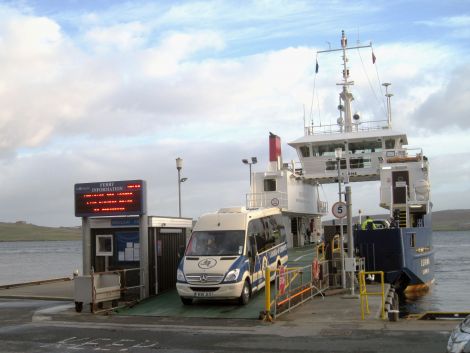ZetTrans / Coping with Covid – a transport perspective
After months of lockdown, communities are slowly emerging to a ‘new normal’ that will impact on all walks of life, including transport. Here the local transport partnership’s policy officer Robina Barton sets out some of the challenges and opportunities that lie ahead.
BEING able to move around and communicate are vital for a community to thrive. It’s no accident that the world’s major cities are located on large waterways. The first settlers saw the importance of access for essential trade and fundamental resources.
The last 100 years have seen the Earth metaphorically shrink in size. Planes, trains and automobiles allow for travel half way around the globe in a matter of hours, and this freedom to travel where we want (roughly) when we want is something many of us have taken for granted.
Although people have warned of the dangers of climate change for decades, it only very recently entered the mainstream consciousness, and mainstream politics, largely thanks to a schoolgirl who began her Skolstrejk för klimatet outside the Swedish parliament in August 2018.
This climate agenda is driving big changes in transportation with the rise of electric vehicles, pool bikes and Uber style taxis – a growth in shared transport.
Mobility is becoming a service, supported by advances in digital technology that allow for complex journey planning over your breakfast.
Shetland is at work on a vision for the future, with ZetTrans securing Sustrans funding for an active travel strategy in 2019 and Shetland Islands Council approving a climate change strategic outline programme in January 2020.
Then Covid-19 happened and stopped everything in its tracks.
After more than two months of lockdown, with transport services functioning at greatly reduced levels and all but essential travel prohibited, it is now time to respond, recover and renew.
Life is unlikely to be quite the same again, and our transport system must support the ‘new normal’, while being accessible, affordable and sustainable.
We need to recognise the Scottish Government route map implications for public transport in Shetland, reinstate the service provision required to meet social and economic need, and redesign transport processes, services and spaces to promote public health.
ZetTrans, one of seven regional transport partnerships (RTPs) in Scotland, is the body responsible for this task. Under the Transport Act 1985, ZetTrans must “secure the provision of such public transport services as ZetTrans considers it appropriate to secure to meet any public transport requirements within their area which would not in their view be met apart from any action taken by them for that purpose”.
In other words, ZetTrans must figure out what Shetland needs, in terms of public bus, (internal) ferry and air provision and see that it is provided.
As an RTP ZetTrans is unusual in two respects. Firstly, it covers a single local authority area (HiTrans, by comparison serves Orkney, Moray, Highland, Argyll and Bute and the Western Isles). Secondly it needs to ensure provision of transport services in an environment where such operations are not commercially viable.
On the Scottish mainland, there is a combination of local authority commissioned services and commercial operators (who provide services profitably in response to local and regional demand) that between them ensure a comprehensive network of public bus services.
In Shetland, this is not possible. Instead, ZetTrans specifies levels of bus, air and ferry provision and works with external operators and Shetland Islands Council to deliver them.
Public and school bus services in Shetland are provided by around 30 operators of varying sizes, inter-island ferry services are provided by SIC and one private operator, and inter-island air services are provided under contract with Airtask Group based in Cranfield.
To make things even more complicated, although ZetTrans has the duty to secure all these services, the bill is footed by Shetland Islands Council. You’d be forgiven for being confused!
The current situation provides big challenges and big opportunities. Challenges in that the capacity of public transport is reduced to about 25 per cent of pre-Covid levels, due to social distancing measures and will remain so for the foreseeable future.
Opportunities in that many people have come to see active travel as a realistic means of getting around.
Going forward, integration and cooperation will be key to success: –
- Integration between local buses, ferries, and planes;
- Integration with school transport, which is the responsibility of the council, but delivered by operators under joint contracts that comprise both school and public services;
- Integration with the needs of key workers, other commuters, people travelling for health, retail, business, social and recreational purposes. Integration with tourism when it returns;
- Integration with the requirements of freight and industry, which are essential to our economic future.
Cooperation and consideration is needed across the Shetland community if we are to make the best use of the limited resources we currently have. Everyone can be considerate in choices they make. Making better choices will protect the transport system so it is available for those who need it most.
Community cooperation with transport planners, and provision of constructive feedback will help ensure that transport services are the best fit they can be during these unprecedented times.
Finally, by choosing to stay local, walking, cycling and wheeling we can all ensure that social distancing is maintained on our public transport, whilst benefiting the wider environment and our own physical and mental health.
The transport partnership has developed education packs on active travel for primary and secondary pupils to support home schooling. Prizes in the form of vouchers of £50 and £100 for Shetland Community Bike Project will be awarded for the best responses to several activities highlighted within the packs. The deadline for submission of entries is 18 June. The education pack can be accessed here.
Become a member of Shetland News
Shetland News is asking its readers to consider paying for membership to get additional perks:
- Removal of third-party ads;
- Bookmark posts to read later;
- Exclusive curated weekly newsletter;
- Hide membership messages;
- Comments open for discussion.
If you appreciate what we do and feel strongly about impartial local journalism, then please become a member of Shetland News by either making a single payment, or setting up a monthly, quarterly or yearly subscription.
















